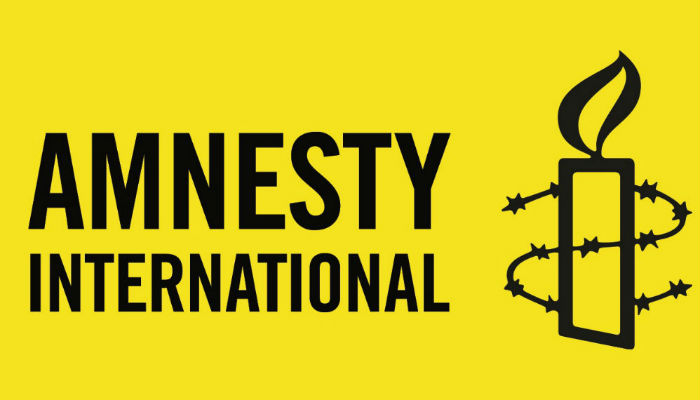Amnesty International looked back at the human rights violations that took place in Turkey throughout 2022 in its annual report, released Monday, recounting ongoing human rights issues such as the suppression of the freedoms of expression, assembly and association, as well as widespread discrimination, torture and ill-treatment.
According to the “Amnesty International Report 2022/23,” which highlights the human rights situation in 156 countries, women, opposition politicians, journalists, human rights defenders, LGBTI individuals and refugees in Turkey continued to face rights violations in 2022.
Freedom of expression remains under threat in the country, the report says, with several journalists, artists and public figures facing pretrial detention and prosecution on terrorism-related charges.
The report refers to 16 journalists from three media outlets and the co-chair of the Dicle Fırat Journalists Association (DFG) who were detained in Diyarbakır in June on charges of “membership of a terrorist organization.”
Authorities arrested 16 journalists, including DFG co-chair Serdar Altan, Mezopotamya news agency (MA) Editor-in-Chief Aziz Oruç and JinNews News Director Safiye Alagaş, on June 16, after they had been detained in the southeastern province of Diyarbakır on June 8, in a move that sparked outrage among opposition politicians, press members and rights activists.
Kurdish journalists in Turkey frequently face legal harassment, stand trial and are given jail sentences for covering issues related to Kurds and the outlawed Kurdistan Workers’ Party (PKK), which has been waging a bloody campaign in Turkey’s southeast since 1984 and listed as a terrorist organization by Turkey and much of the international community.
The report also highlights the case of pop singer Gülşen, who was imprisoned in August for allegedly “inciting the public to hatred and enmity” in relation to a video circulated on social media. The singer was later released.
The report also points to a law introduced by the Turkish Parliament in October granting the authorities increased powers over social media content and imposing additional liabilities on social media companies.
According to the report, freedom of assembly has also been curtailed in Turkey, with authorities unlawfully restricting Pride marches and preventing peaceful gatherings such as the Saturday Mothers/People, a group advocating for victims of enforced disappearances.
Enforced disappearances, which were common in Turkey during the 1990s, made a comeback following a failed coup in July 2016.
After the attempted coup, 30 people — 11 of them in Ankara — were reportedly abducted in black transporter vans according to eyewitness reports or security camera footage in the area.
Some victims of enforced disappearance following the attempted coup said after they were found that they were subjected to torture during the time they were “missing.”
Amnesty’s report also points to the continued harassment of NGOs and the use of legal actions to suppress opposition parties, including an ongoing lawsuit to close the second-largest opposition party, the Peoples’ Democratic Party (HDP).
The HDP is facing a closure case on terrorism charges that was filed in March 2021 and could be concluded before the May 14 elections since the Constitutional Court, which is hearing the case, has rejected the HDP’s request to delay the verdict until after the elections.
In a bid to circumvent the risks that could emerge from its possible closure, the HDP will run in the elections under the banner of the Green Left Party (YSP).
According to Amnesty, impunity remains a significant concern in the country, with Turkish courts suspending the prosecution of 26 Saudi nationals charged with the murder of journalist Jamal Khashoggi.
On April 7 an İstanbul court confirmed a halt to the trial in absentia of 26 suspects linked to the killing of Khashoggi and its transfer to Riyadh, a decision that has angered rights groups.
The report also mentions Turkey’s failure to implement European Court of Human Rights (ECtHR) judgments in cases such as that of businessman and philanthropist Osman Kavala and former leader of the HDP Selahattin Demirtaş.
The Council of Europe launched infringement proceedings against Turkey in February for its failure to release Kavala, marking only the second time such a procedure has been invoked against a member state.
According to Amnesty, human rights defenders face multiple prosecutions, with several convicted on terrorism-related charges. The report refers to the unjust detention and prosecution of 18 members and staff of the Migration Monitoring Association (GÖÇİZDER), accused of propagating terrorism and funneling funds to armed groups. GÖÇİZDER is an NGO working to highlight human rights violations resulting from forced displacement in Turkey. In September three UN special rapporteurs sent a joint letter (Ref. AL TUR 6/2022) to the Turkish government expressing concern about their detention and criminalization.
The report also highlights ongoing discrimination against women and refugees. Men killed at least 225 women in acts of femicide in the first 10 months of 2021, according to official government statistics. The report notes that Turkish authorities used unlawful force, including firing live ammunition, to summarily return to Iran thousands of Afghans seeking protection.
The report further cites serious and credible allegations of torture and other ill-treatment in Turkey last year, referring to the case of Ferhan Yılmaz, who died after reportedly being subjected to abuse by prison guards.
The Mezopotamya News Agency reported at the time that two inmates in Silivri Prison had died in April after being subjected to severe beating and mistreatment by prison guards. Images of Yılmaz, one of the inmates, emerged on April 13, showing him badly injured in a hospital bed. In one photograph Yılmaz’s face appears bruised and his nose broken.
After the abortive putsch in 2016, ill-treatment and torture became widespread and systematic in Turkish detention centers. Lack of condemnation from higher officials and a readiness to cover up allegations rather than investigate them have resulted in widespread impunity for the security forces.

